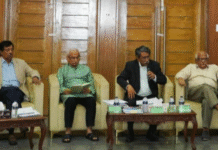Transport strike for showing muscle power of minister’s organisation!
 Transport workers have enforced the countrywide 48-hour transport strike demanding amendment to the recently passed Road Transport Act despite knowing that it is not possible to amend the act now, according to associations of transport owners and workers.
Transport workers have enforced the countrywide 48-hour transport strike demanding amendment to the recently passed Road Transport Act despite knowing that it is not possible to amend the act now, according to associations of transport owners and workers.
“The aim of this strike is to merely show muscle power of the minister’s organisaiton. There is no scope to amend the act now as the session of the current parliament is to be ended today, Monday,” said a transport leader seeking anonymity.
Road transport and bridges minister Obaidul Quader at a function on Sunday told newsmen that there is no scope to amend the act now.
Speaking to Prothom Alo, former adviser to a caretaker government Sultana Kamal said such movement is not acceptable. “You cannot demand people responsible for road accidents cannot be brought to book,” she observed.
Bangladesh Road Transport Workers Federation (BRTWF) began the 48-hour strike at 6:00am on Sunday, causing immense suffering to the commuters in the city as well as elsewhere in the country.
Following students’ movement for safe raod, the associations of transport workers were cornered and were unable to oppose the transport act, sources at the ministry and transport associations said.
Transport leaders said the muscle power of the leaders and associations may seem vulnerable to the general workers and owners if they do not show their strength now.
Steps are not taken to call off strike through discussions to end public sufferings, ministry officials and transport leaders said adding, as per the government wishes, the owners and workers plyed their vehicles braving risks during the opposition’s violent movement in 2014-2015.
The source said the transport workers normally enforce strike for an indefinite time, this time their programme is for only two days. As a result the government has accepted the programme, according to officials and transport leaders.
“The transport workers have enforced the strike and the owners have nothing to do,” Bangladesh Road Transport Owners Association president Mashiur Rahman Ranga told Prothom Alo.
Mashiur, also state minister for local government, rural development and co-operatives, admits that opinions from the workers and owners were taken before the passage of the act.
As the representative of the workers, shipping minister Shajahan Khan, who is the executive president of BRTWF, also engaged in all procedures of preparing the draft of the act.
Despite, his organisation BRTWF enforced the strike causing suffering to the people, demanding the amendment of the act.
The demands include making all the offences by road accident ‘bailable’, cancellation of the provision of fining Tk 500,000 for involvement in a road accident, keeping a representative from their federation in any probe body formed for road accident, fixing minimum educational qualification for getting driving license to class-V, and stopping police harassment on roads.
Workers federation general secretary Usman Ali said their oppinions were taken before passage of the act. “Half of our recommendations were complied while half were not,” he said.
Usman said the next course of action would be taken after holding a meeting if the demands are not met.
Two cabinet members — Shajahan Khan and Masihur Rahman Ranga, however, did not oppose the draft act when it was approved in the cabinet. They also did not give any statement against it when the bill was passed in the parliament.
Following the students’ movement for safe road after the death of two students on 29 July, the draft act was approved in the cabinet on 6 August, and the bill was passed in the parliament on 19 September, with five-year jail term and Tk 500,000 fines for casualities in road accidents.
*This report, originally published in Prothom Alo print edition, has been rewritten in English by Rabiul Islam









